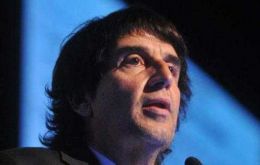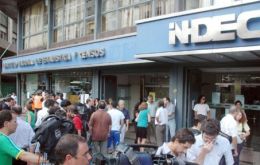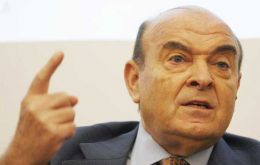MercoPress. South Atlantic News Agency
Tag: Argentina inflation
-
Thursday, February 28th 2013 - 06:04 UTC
Ninety consecutive months of two-digit inflation in Argentina

Two-digit inflation in Argentina has reached 90 consecutive months, according to economist Carlos Melconian who added that since 2001 the prices’ increase in the country has averaged 500%.
-
Saturday, February 16th 2013 - 20:39 UTC
Cristina Fernandez inflation index for January less than half private estimates

Official inflation in Argentina increased 1.1% in January compared to the previous month, Indec national statistics bureau reported on Friday. The hike in prices was led by transport as train and bus fares increased by 6.1%. The annualized rate jumped to 11.1%.
-
Thursday, February 14th 2013 - 01:49 UTC
Argentina’s January inflation, 2.58%, highest in 22 months according to private estimates

Argentina’s inflation last January was the highest in twenty two months, 2.58%, according to the average of private estimates which are banned from making public their findings, but which are released by the Congressional Freedom of Expression Committee.
-
Tuesday, December 4th 2012 - 16:24 UTC
Punished by inflation a third of Argentines with difficulties to face monthly payments

A third of Argentines have difficulties to face monthly costs because of inflation and lagging salaries, and 11% admit to “many difficulties” according to the latest Poliarquía public opinion poll released this week.
-
Saturday, October 20th 2012 - 06:02 UTC
Argentina’s 12-month inflation expectations yield slightly to 27%, says UTDT

Argentina's 12-month inflation expectations slid in October for the first time in eight months, according to the median estimate in a survey published by the Torcuato Di Tella University, UTDT.
-
Saturday, October 13th 2012 - 08:24 UTC
Argentine official inflation in September 0.9%, less than half private estimates

Official inflation in Argentina reached 0.9% in September against August, accumulating 7.8% in the first nine months of this year and 10% in the year, according to the Indec national statistics bureau.
-
Monday, October 1st 2012 - 08:43 UTC
Former minister says Cristina Fernandez in Harvard showed how she really is

Former Economy Minister Domingo Cavallo assured that Argentina’s current problems are much more serious, than back in 2001 since nowadays “people are desperate because they want to preserve the value of their savings and the Government does not allow them to do so”.
-
Saturday, September 15th 2012 - 05:13 UTC
Argentina’s money supply adjusted for inflation climbed 22.6% in last 12 months

A benchmark measure of Argentina's money supply rose 34.6% on the year in August, according to the central bank. In its monthly monetary report published late Thursday, the Central Bank of Argentina said its M2 measure of money supply averaged 403.93 billion Argentine pesos (86.6 billion dollars) last month.
-
Friday, July 20th 2012 - 08:27 UTC
Argentines inflation expectations for the next 12 months in July climbed to 35.7%

Argentines inflation expectation for the next twelve months climbed in July to 35.7% from 34.9% in June according to the latest report form the Di Tella University Finance research centre (UTDT).
-
Thursday, July 12th 2012 - 07:11 UTC
Argentina displaces Venezuela as holder of the region’s highest inflation title

Venezuela’s president Hugo Chavez running for re-election received a considerable boost for his campaign from his peer and political associate President Cristina Fernandez when it was revealed that Argentine inflation in the first half was over two digits.
